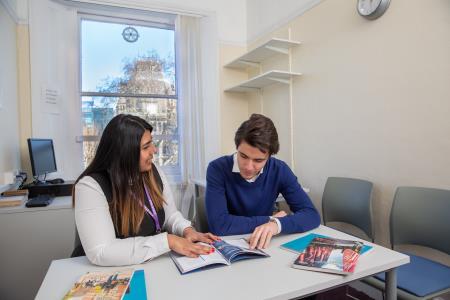Related articles
The transition from GCSE to A level is a critical stage in a young person’s education. For some it is an exciting time of opportunity: a chance to focus on their favourite subjects and move one step closer to a dream university and career. For others, it can be a more daunting experience: whittling down nine or more GCSE subjects to just three or four; thinking about future professions and undergraduate courses; and, crucially, deciding on where to study for Sixth Form.
During the two years of Sixth Form, students will not only prepare for their A level exams but, at the end of Lower Sixth/beginning of Upper Sixth, will write their Personal Statements and submit their university applications. As students decide whether to remain at their current school for A levels or move elsewhere, therefore, it is vital that they research the available options carefully. The information below is designed to help guide you in the questions you should be asking as you prepare for your journey to A levels and ensure you select the Sixth Form that is right for you.
-
What subjects are on offer?
On the GCSE programme, you may be studying up to 9 or 10 subjects covering the arts, humanities, and sciences. On the two-year A level programme, you will study just three or four subjects, the choice of which will depend on what you want to study at university. There are a number of specialist A level subjects which you may not have encountered at GCSE (for example, Business Studies, Film Studies, Psychology, Government and Politics), and not every Sixth Form will offer every subject. The selection of A level subjects on offer will vary from school to school or college to college, and it is important you research this carefully to ensure your chosen Sixth Form can accommodate your interests and needs. Questions to ask:
-
What subjects does the Sixth Form offer?
-
Does the Sixth Form offer any specialist subjects which may not be offered elsewhere?
-
Does the Sixth Form offer the subjects you need to access your chosen university course?
-
Does the Sixth Form have a particular specialism in one or another area?
-
What help and guidance can you expect with UCAS and the Personal Statement?
In addition to preparing for your A level exams, in the Lower and Upper Sixth (Years 12 and Year 13), you will make your university course choices and submit the all-important UCAS application. This is a crucial period in your education, and it is vital that you receive the right support as you research the higher education options available to you and put together your personal statement. For those applying for Oxford and Cambridge, and most courses in Medicine, Veterinary Medicine/Science, and Dentistry, there is an earlier UCAS deadline, and the unique application process for these universities/specialisms requires additional preparation. Make sure you find out exactly what help and guidance your Sixth Form can provide, especially if you are considering universities abroad, particularly the US.
-
Will your Sixth Form help you to research the most appropriate universities and course choices for you?
-
Is there a designated UCAS advisor/higher education team who will support you with the UCAS form and drafting and redrafting the Personal Statement?
-
What additional support does the Sixth Form provide for Oxbridge applicants?
-
Can your Sixth Form help prepare you for the specialist admissions tests for Oxbridge, and medical and dental schools (e.g. the BMAT and/or UCAT)?
-
Will your Sixth Form provide interview practice for Oxbridge and medical/dental school interviews?
-
Can your Sixth Form help you to organise the required work experience for medical applications?
-
What Academic Support is provided outside of the classroom?
The jump from GCSE to A level, both in terms of content and academic level, is no doubt a big one. Even for the strongest students, the transition can be challenging, and you may find that getting that A*/A grade at GCSE doesn’t automatically translate into the same grade at A level. You may be required to obtain specific grades in certain subjects for your chosen university degree courses. How will your Sixth Form help you get there?
-
What support can your Sixth Form provide for those who might be struggling with the transition from GCSE to A level?
-
Does your Sixth Form provide additional academic support sessions to help you develop vital skills in areas such as exam technique, essay writing, timed essays, time management and organisation?
-
What additional content/support can your Sixth Form provide to push those who are aiming for that illusive A* grade?
-
Does your Sixth Form offer careers advice or help with work experience?
Although it may seem daunting, spending time thinking about and researching career paths that might interest you can help you to focus your A level subject selection and narrow down your university course choices. Finding relevant work experience is also a great way to boost your Personal Statement and UCAS application, and help you stand out from the crowd. Make sure you find out what careers advice your Sixth Form can offer, and whether they can help in arranging work experience.
-
Is there a designated Careers Adviser within the Sixth Form who can help guide you on possible career paths?
-
Can your Sixth Form help you to organise relevant work experience?
-
Does your Sixth Form offer support with CV and Cover Letter workshops?
-
What enrichment and co-curricular opportunities are on offer?
Just as important as your Sixth Form’s academic provision is life outside the classroom. The A level programme is undoubtedly intense, and although you will need to work hard to secure top grades and your university offers, it is important for your mental wellbeing that there are opportunities for you to explore your interests outside of your A level studies, have fun and socialise, and develop as a well-rounded individual. Co-curricular and enrichment activities are also great material for your Personal Statement, and universities such as Oxford and Cambridge love to see that students have more than one string to their bow.
-
What co-curricular and enrichment activities does your Sixth Form offer?
-
Is enrichment compulsory?
-
Is there a good mix of co-curricular opportunities; for example, those with an academic focus as well as sport, music, drama etc?
-
Do students have a say in the enrichment activities on offer? Is there capacity for students to set-up their own clubs?
-
How big are the class sizes, and what is expected in terms of the school day and uniform?
Sixth Forms come in all shapes and sizes, and it is important that you find one with the right atmosphere for you. Some students prefer to be part of a large school community; others benefit from smaller class sizes and more one-to-one support. The structure of the school day may also vary from Sixth Form to Sixth Form. Everyone is different, but make sure you ask the right questions to understand what will be expected of you.
-
Is the atmosphere formal or informal?
-
Is there a school uniform or dress code in the Sixth Form?
-
What is the average class size?
-
Is there compulsory morning registration, or can students come in for their first lesson and leave when lessons finish?
To find out more about the Sixth Form provision at Kensington Park School and how we can support you to achieve your goals, click here.
You can also contact us directly on admissions@kps.co.uk or call us on +44 (0) 20 7616 4402






